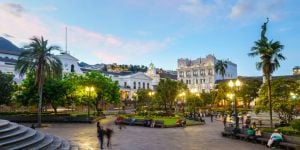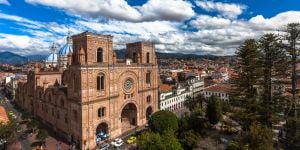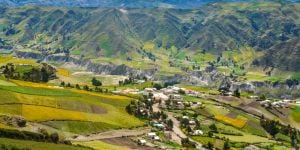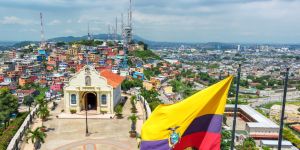Crime and other statistics in Ecuador
If you want to know more than just what people are saying about conditions here in Ecuador, you can always look at statistics. Naturally, statistics can be used to mislead, and you always have to consider the source. Nevertheless, a few good statistics can add to your knowledge. Climate statistics, do seem a little off for any specific area, but they do show a general trend for the climate in Ecuador.
It is not that hard to find statistics about Ecuador through your favorite search engine. I have included a few links below. But there are many more available. If you find something you might think could be of interest to others, please post that information here. The important thing is to explore and have fun.
Crime Statistics
http://www.nationmaster.com/compare/Ecu … ates/Crime
Causes of Death (a little confusing, but read the instruction in the middle near the bottom of the page). You choose a country on the right, and read the statistics on the left. A lot of interesting stuff.
http://www.worldlifeexpectancy.com/worl … structions
Road traffic fatalities
http://chartsbin.com/view/2642
I would like a moment to speak about traffic fatalities. They are measurably higher here in Ecuador than North America. There are a number of reasons for this, and it isnt just because Ecuadorian drivers are crazy, although they do sometimes seem that way at times. Road safety conditions are usually not to the standards of NA, especially when you leave the Pan American highway. Throughout the country, natural events (landslides, flooding) can create a real hazard and the roads are often not capable of overcoming these hazards. Ecuadorians are less likely to keep their cars in top condition. I am sometimes appalled at the condition of the tires some people are driving on. But, many do not need cars, so traffic fatalities may be not be a pressing issue for some.
What is an issue for everyone is crossing a street. I almost got hit three times before I learned my lesson. Ecuadorian drivers do not give way to pedestrians. What is especially troubling are cars coming from behind you and turning left (into the street you are crossing). Since they can see you and you cant see them, it would seem they would be wary of you and yield the right-of-way. Dont assume that. Look behind you before you cross, and dont trust the absence of a blinker. Be warned; never assume the right of way in Ecuador streets unless you are in a controlled walkway with a visual signal and timer. These walkways are only on one side of the same street, so your right-of-way only extends for the corner crossing that has the pedestrian signal. That last statement is hard to explain, but pay attention and you will understand. And paying attention is really what I am suggesting
While I am waxing on about statistics, let me share a statistic that might be of interest to Americans. It concerns terrorism deaths, show in the link below:
http://www.johnstonsarchive.net/terrori … -rate.html
One value of statistics is that they can guide us in making good decisions to know what we need to change and work on and what doesn't require change. So here are the statistics, based on the completed 2011 results:
On average in 2011, 89 people were killed on the roadways of the U.S. each day for a total of 32,485 per year. There were 6 deaths from all terrorism in the United States during 2011. If you average all terrorists deaths over 10 years (2001 to 2011, which includes 911) on average, less than 3,038 died over ten years in contrast to well over 300 thousand for auto accidents (conservatively speaking).
So the point to contemplate is this: Why are trillions of dollars being spent to combat terrorism and the country is being turned into a police state, not to mention the suspension of rights, over the deaths of 3,038 people, when much of that money and that focus could be used to improve traffic safety and might have saved as many as 300 thousand during that 10 year period. This does not even begin to consider the many other critical situations that could have been aided if so much money and energy was not put towards homeland security. I know this is both a political and complicated issue with many arguments to be made. My point is that information and transparency does allow open and honest discussion where people can make choices based on their individual values and sense of right or wrong. Their government should be transparent and honor the choices that arise from that transparency Lets compare that to Ecuador.
Transparency is not hundred percent in Ecuador. That level of transparency may only be found in Iceland. But, Ecuadorians tend to be much better informed that Americans (less fooled by propaganda) . Ecuadorians are also very easy going. But, there is a limit to there being laid-back. When they have had enough (or things get out-of-hand), they will rise up, using the power of the people to make changes. The culture here is non-violent and the military have most often sided with the people, if it comes to choice between political agendas and the will of the people. It is one of the reasons Ecuador has had so many Presidents ousted in the past. They tend to have been greedy and ineffective. It is just the way it is in South America. But misdeeds have typically resulted in politicians fleeing to other countries when their misdeeds are made public. You will, as a permanent resident, have voting rights here. I know that I feel that my opinion, even as an expat, has a much better chance of being part of the solution here than it ever did in the United States. I am not Canadian, but I would imagine this might also apply to some degree with the many Canadians here.
Great article Joseph.
I spent two weeks in Ec recently and loved it.
I quickly realized that the drivers have the right of way (or at least assumed they did). I made sure that I stayed out of their way and had no problems at all. This compared to the NA attitude where typically the pedestrians have the right of way philosophy. Step off the curb and figure that the on coming drive sees you (or not) and the loser is always the pedestrian. I found Ec a refreshing change. Lol, albeit scary at times but you know it's your responsibility to get out of their way and you can most of the time get out of their way faster than they can get out of your way.
Just my two cents anyways.
Really Karlos, you are banned and you still persist in advertising on this forum. That is rather self-serving and disrespectful of those posting here. Have you consider that this behavior will not make you look very good and might cause people to not trust you? In fact, it might cause the kind of negative repetition you might not want. Just something for you to consider Karlos.
Joseph K wrote:Really Karlos, you are banned and you still persist in advertising on this forum. That is rather self-serving and disrespectful of those posting here. Have you consider that this behavior will not make you look very good and might cause people to not trust you? In fact, it might cause the kind of negative repetition you might not want. Just something for you to consider Karlos.
Not to be confused with Carlos "with a C"" ...
Carlos aka "ElGringoBueno" 
PS Karlos, Joseph makes a good point, Perhaps you'll find a way to support the site with a paid advertisement [Business Directory, Classified Ad, etc.] and then the clients you've satisfied having met them in that manner, can refer you as they see fit, in response to future inquiries on the site.
.
Joseph,
I'm pleasantly surprised that as as expat/pensionado I will be able to vote.
Even more reason to aprender espanol ...
Carlos aka "ElGringoBueno"
PS I finally posted something without a boatload of smileys and parentheses ...
PPS However, still haven't kicked the "ellipsis monkey" off my back ...
Comparisons based on international statistics should be taken with much salt. Countries use different definitions of crimes, death types, etc.; local officials may have reason to fudge numbers that cause distortions when rolled up to the national level; and many other problems.
Nonetheless, with that caveat, I enjoy reading such stats.
After a year in the Philippines, I no longer assume any driver is going to stop for any reason, including red lights. I almost got killed a few times before realizing that cars don't stop at a red before turning right, even if a pedestrian is crossing.
An old high school teacher once told me, "Statistics are like bikinis. What they reveal is exciting, but what they cover up is essential."
Can't speak for Ecuador, but have always found that most places I have visited petty theft is much higher and more common than stats say. Imagine often times the crime is never reported by victim, or especially if smaller town the proper paper work never gets filled out.
Can't speak for Ecuador again, but in regards to driving have also found if one is driving they need to be very careful going around blind corners. Can't tell you how many times have seen someone passing a car around a corner, or even how many times have seen someone coming straight at me around a corner.
j600rr wrote:An old high school teacher once told me, "Statistics are like bikinis. What they reveal is exciting, but what they cover up is essential."
Reminds me of a college teacher who was asked how long the term paper he was assigning needed to be: "Like a woman's skirt -- long enough to cover the most important items, but short enough to maintain interest."
Either of them would be immediately fired today.
j600rr wrote:Can't speak for Ecuador, but have always found that most places I have visited petty theft is much higher and more common than stats say. Imagine often times the crime is never reported by victim, or especially if smaller town the proper paper work never gets filled out.
As you say, probably true everywhere, but doubly so in third-world countries where police are often understaffed, poorly equipped, and (consequently) ineffective. Even crime that goes beyond 'petty' is often not reported here, because the attitude is "Why bother? It won't do any good anyway."
Joseph K wrote:What is an issue for everyone is crossing a street. I almost got hit three times before I learned my lesson. Ecuadorian drivers do not give way to pedestrians.
Would you go so far as to say this applies to all of Latin America? Because I've heard it about Mexico, too.
Have to say this is one of those "different culture" things that I will never, ever understand. Okay, so a pedestrian doesn't have the right-of-way. I get that. But (pretending I am the driver now) am I REALLY just going to plow my car into someone on the street, because I can? Or is it that they don't bother to look, and so just don't see them in time to avoid mowing them down?
From my experiences in different Latin American countries the whole driving thing pretty much applies in all of them. For that matter would say every third world country have been that the crazy driving has been an issue. Oddly enough it makes no sense in Latin America, where as anyone who has lived in a Latin American country knows that the people are never in a rush to do anything. Yet the term maniac drivers is a pretty common term for their driving. Just look both ways, and then look both ways again.
dreams-of-latin-america wrote:Okay, so a pedestrian doesn't have the right-of-way. I get that. But (pretending I am the driver now) am I REALLY just going to plow my car into someone on the street, because I can? Or is it that they don't bother to look, and so just don't see them in time to avoid mowing them down?
The driver here is always asserting the right of way. As they drive, if someone is near the curb, looking like they want to cross, the drive blows his horn as a warning. Everyone here understands that. But the turning situation is a bit different.
The driver is approaching from behind the pedestrian, but does not know the intention the pedestrian or when he or she might step out into the road. But still, recklessly, the driver just proceeds around the corner. That behavior is very hard to understand. But, things are simply what they are. The solution in every country is to develop strategies to avoid this crazy behavior. The problem for expats is that don't know those strategies (or that they are even necessary) and have to learn them, hopefully before they suffer the consequences.
Here is what I now do: if it is not a one-way street which cars cannot turn into, I always cross further down from the corner so I can see if a car is turning. It is easier to glance sideways than to turn completely around. Even then, without a blinker, you have no idea of the intention of the driver until they actually turn. This strategy is perhaps a little inconvenient, but it works.
Since I am on to strategies, let me explain one possible danger and the strategy to avoiding it. This happens in Guayaquil more than any other city. Cabs will sometimes have an arrangement with a another person. After they pick you up, they then stop to pick up this second person who proceeds to rob you (within the privacy and shelter of the cab so even daytime is not safe)
If you are in a cab, and the cab driver stops to pick someone up (something he/she should not do) immediately step out of the cab. I usually sit behind the cab driver and keep my belongings in my lap to make this easier. Then go to the cabbie's window and hand them a few dollars (whatever the fare might have been - don't worry about overpaying in this case). Walk away immediately; do not get back into that cab under any circumstances. Hail another cab or walk into a business.
If you need to put things in the cab's trunk, have someone call for a cab instead of hailing one off the street. Calling a cab is much safer than hailing one. I don't take these precautions in Loja, but most definitely do in Guayaquil or if I have to carry something very valuable.
Interesting. I have always been an agressive pedestrian when it comes to claiming the right-of-way, but then I'm also always ready to jump out of the way if I lose the battle.
j600rr wrote:From my experiences in different Latin American countries the whole driving thing pretty much applies in all of them.
The Philippines (probably because of the Spanish colonial influence) is very much a Latin American country in many, many ways -- driving being one of them. I did a blog post on the Philippine driving test (too long to repost here).
Bob
Bob,
That is verbatim the same test as given here in Cuenca, only they left one out:
When you see a pedestrian in a crosswalk, you should.
a) slow down and give them the right of way.
b) honk
c) honk and speed up
d) speed up and swerve in an attempt to ding them
Good post. Happy to see it doesn't only occur here!
Thanks, Neil. Hmmm, I wonder how the Philippines forgot that question? Maybe they just thought it was too basic.
It looks like I'll feel right at home in Ecuador.
j600rr wrote:An old high school teacher once told me, "Statistics are like bikinis. What they reveal is exciting, but what they cover up is essential."
George Bernard Shaw said "There's liars, there's damn liars, and there's statistics."
ZenSPIKE wrote:Bob,
That is verbatim the same test as given here in Cuenca, only they left one out:
When you see a pedestrian in a crosswalk, you should.
a) slow down and give them the right of way.
b) honk
c) honk and speed up
d) speed up and swerve in an attempt to ding them
Good post. Happy to see it doesn't only occur here!
Neil: I saw this on Gringo Tree's newsletter today. Please check
out these new crosswalks and let us now if they are any more effective in stopping traffic.
The Cuenca Transit Authority is installing new pedestrian crossings in high-traffic areas of the city. The crossings stop vehicular traffic in all directions to allow pedestrians to cross busy streets.
Bob,
I'll tell you what, I won't be the first to test this new concept. There are crosswalks already in place all over the city. Drivers do not even notice them. If you are in a crosswalk, expect the driver to proceed through it, and make his turn, or continue on through. It is the first lesson of survival here. When I first visited, I assumed those little stripes in the road meant something, and damned near got creamed.
" Fool me once, shame on you, fool me twice, shame on me " is the mantra of survival for the pedestrian here.
Never assume red means stop, or those stripes mean you are safe to cross.
I think this a ploy by the hospitals here to " drive " up business! < grin >
Eyes Wide Open in Cuenca
Neil
ZenSPIKE wrote:Bob,
I'll tell you what, I won't be the first to test this new concept.
[ ... ]
I think this a ploy by the hospitals here to " drive " up business! < grin >
Eyes Wide Open in Cuenca
Neil
LOL. Too bad, because I was counting on you to be the guinea pig cuy.
I've filled that role too many times in the past. I'm learning.
What amazes me is how crafty the street dogs are in timing their crossings. Much to be learned via the mutts. They just weave through the traffic, as if they know the rhythm and flow before it happens.
Geez, I just admitted dogs are smarter than me!!
Stay Well,
Neil
Make your relocation easier with the Ecuador expat guide

Work in Ecuador
Ecuador is famous as a retirement haven. But you might not want to wait until retirement age to move there and ...

Healthcare in Ecuador
Ecuador, as a fast-developing nation, has laws that are constantly evolving, but one thing is certain: the ongoing ...

Food in Ecuador
What kind of food will you find in restaurants, cafes, and private homes in Ecuador? Many restaurants in Ecuador ...

Leisure activities in Ecuador
You have made it to Ecuador, now what is there to do in your free time? A lifetime in Ecuador isn't enough time to ...

Work in Cuenca
There is no doubt that the Spanish colonial city of Cuenca is a wonderful place to call home, as demonstrated by ...

Accommodation in Cuenca
The rose-colored lenses through which potential expats have been made to view Cuenca often blur how the real ...

Family and children in Ecuador
Family is everything to an Ecuadorian. The extended family unit is the most important aspect of life in Ecuador, ...

Setting up a business in Ecuador
Forum topics on living in Ecuador



